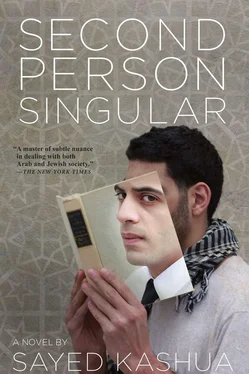“How’d it go?” number six asked her halfheartedly.
“Hard, stressful, but I think it went well.”
“Yonatan, Yonatan Forschmidt,” the woman with the file said and I jumped up from the floor and straightened out. “That’s me,” I said.
“Good luck, Yonatan,” number six said.
Yonatan Forschmidt. That’s the name I’d put down on the application, the name I’d used for the psychometric exam, the name that had appeared on the sheet in the waiting room. For the previous six months I had been walking around with Yonatan’s ID in my pocket, or rather, to be exact, with two IDs — his, which I’d found in the attic, and mine.
I remember how scared I was the first time I’d identified myself as a Jew. It was in a café on Ben Yehuda Street, the fifth one I’d gone to in search of a job. The boss looked at Yonatan’s ID, eyed his old picture, and then filled in his personal details on the application without any hint of suspicion. In all of the other cafés, where I’d identified myself as an Arab, the bosses suddenly didn’t have waitering positions available, despite the waitstaff wanted sign on the door. Either that or they offered me a job as a dishwasher. I agreed to that once. It was called chef’s assistant, but all I was asked to do was wash dishes, clean the bathrooms, bring in the supplies, and take out the garbage. I had to come in at seven thirty in the morning and stay until six in the evening and my pay was minimum wage. I knew that the waiters worked less and made more. All of the waitstaff were Jewish and all of the kitchen workers were Arabs: the ones the customers didn’t see were always Arabs.
Once I’d gotten the job by posing as a Jew, I felt embarrassed by what I’d done and decided I wouldn’t show up for my first shift. But I needed the money and I convinced myself that I had not done anything wrong. Just a little hoax so I could get a reasonable job. The first week was training and throughout that period I focused on not answering the kitchen staff in my native tongue when they said good morning in Arabic or asked if I’d like something to eat. The training went well and the owner saw that I could be trusted. I always showed up on time, didn’t ask for days off, didn’t come in tired, and was generous with the customers, even the most difficult ones.
The kitchen staff consisted of Muhammad, whom everyone called Mukhi; Rafik, whom everyone called Rafi; and Suleiman, who preferred to be called Soli. All three of them were from east Jerusalem, and all three of them smoked, prayed, and talked about girls all the time.
As opposed to the waitstaff, who were given their shifts in advance, Mukhi, Rafi, and Soli worked all day every day, from seven in the morning until midnight, except for Fridays, which were short days, and Saturdays, when the café was closed.
My relationship with the owner, the kitchen workers, and the other waiters was polite, nothing more. I didn’t let anyone get too close to me, especially not Dana, a young waitress who, like me, preferred the morning shift — she had Bagrut matriculation courses in the afternoon. She was a pretty, smart girl who had dropped out of high school because she couldn’t stand the teachers, the other kids, and the material that was being taught. Nor could she stand the sleazeballs and bimbos who went to the Bagrut courses in the afternoon instead of high school, but she had no choice. She wanted to go to college, probably to study psychology or art history; she wasn’t sure. She invited me over to her place in the Nachlaot neighborhood for Saturday brunch but I had to restrain myself and say no. Back then, I couldn’t imagine lying to other people about my identity, although, after spending a night practicing the signature he’d left in his books, I had opened a bank account in Yonatan’s name. I told myself that my lie was solely for the purposes of work, and it could not be allowed to spread to my personal life, even though I wasn’t sure I had one of those.
“Your portfolio, please,” the woman with the file said, and I already regretted coming. I opened my bag and took out a cardboard box, my portfolio. The three members of the admissions committee sat around a round table: the chair of the department, an instructor, and a fourth-year student. They looked over the paperwork in front of them and waited for me to take out my work.
The applicants who had made it through the first two stages of the application process were asked, for the final stage, to do three things: a story in ten pictures, a self-portrait, and three pictures of your choosing. I gave the secretary my box.
“What’s this,” asked the instructor. “Store-developed photos?”
“Yes,” I said. He started looking through the first photos, my story in ten pictures. In contrast to those of the skinny girl from the waiting room, my pictures were all standard size. The Armenian had developed them for me and I had not even thought of blowing them up or framing them.
“When did you start taking photographs?” he asked.
“A year ago, about a year ago.”
“Did you study anywhere?” he asked, without taking his eyes off the photos.
“No, I studied alone. I mean, someone showed me the basics and I read some books,” I said, and the instructor passed the ten photos to the head of the department.
“So you didn’t study photography in high school or anywhere else?” the instructor continued.
“No,” I said, and I felt myself blush. I hated myself for having the gall to come to this place, for listening to Osnat and Dana, who said I would get into Bezalel with my eyes closed.
“Do you have your camera with you now?” the head of the department asked, spreading the photos out on the table so the student could see, too.
“Yes,” I said. “I have it here.”
“Let me see it, please,” the department head said, and I opened the camera bag, which had almost always been on my shoulder during the past year and a half.
“Wow, a Pentax,” he said, when I handed it to him. “Do they still make these?” The department head held the camera in both hands and passed the rest of the pictures over to the instructor.
My portfolio consisted of portraits. I asked permission and I photographed people. Yonatan had focused on portraits and I studied his work at night, tried to understand what it was about his photos that drew me in. I also studied his books, which dealt only with the art of portraiture, and I looked over each and every photograph under the lamp in the attic for hours. Since I’d learned how to use the camera, I’d been taking pictures of people, especially in the Old City.
Ruchaleh had split the caretaking work into three shifts and I took the afternoon and night, back to back, and that, along with the waitering, left me a lot more money for photography. After a few weeks at the café I worked up to asking the owner if I could take pictures, and I started shooting on the premises, taking pictures of the employees once they’d given me their permission. I used those for my story in ten pictures. They were portraits of the kitchen workers, from the moment they were given an order until they slid the dish out from under the window in the wall that divided the café and the kitchen and hit the bell. I had also been taking pictures of the café regulars, the ones who came each morning, and for the category of three pictures of my choosing, I picked Sara, who, so long as she wasn’t in the hospital, came to the café each morning along with her Filipina caretaker. In the picture I submitted, she was holding a cup of tea in both hands and smiling with her eyes. The other two shots were from the Old City: one of the Armenian laughing, a gold tooth glinting in his open mouth, and the other of a border policeman smiling as he checked my ID, which is to say Yonatan’s.
Читать дальше












